In 12 Angry Men by Henry Fonda and Reginald Rose a young man charged with the murder of his father, is in the hands of twelve men all with entirely diverse views. After hearing, the case the jurors go into discussions. Eleven of the twelve men are convinced that the boy murdered his father. However, Juror #8, Davis (Henry Fonda). Doesn’t necessarily believe the boy is guilty, rather wants to explore the evidence and discuss the trial further. Davis, was the most important juror in Twelve Angry Men for a number of reasons.
First is that when all the other jurors voted guilty without even thinking about their decisions, Juror #8 suggested that they talk about it for a little bit before jumping to conclusions. When asked if he thought the boy was guilty or not guilty, he said, “I don’t know. ” This shows that he hadn’t decided one way or the other. When asked why he voted this way, he replied, “It’s not easy for me to raise my hand and send a boy off to die without talking about it first. This shows that he wanted to talk things over with the other jurors before he makes a decision. Even when some of the other jurors got mad and started arguing with him, he stayed composed and tried to work things out in a rational manor. Later on he said, “I just want to talk for a while. ” This is more proof that he wanted to discuss the issue. Secondly Juror #8 re-enacted scenes from the night of the murder in order to prove his points. The third reason is that he convinced Juror #9 to change his vote to not guilty.
This was a vital step because it added question and doubt to the other jurors and made it acceptable to change their minds as well. This was important because if no one changed his or her decision in the second vote, Juror #8 said he would change his vote to not guilty. However, Juror #9 did change his vote giving Juror #8 more time to talk about the case. Juror #9 said, “He gambled for support and I gave it to him. I want to hear more. ” By convincing one person to change their vote, it forced everybody to listen to more arguments, and possibly change their thinking on the case.
The third reason Juror #8 was the most important juror is that he re-enacted scenes from the night of the murder in order to prove his points. The first time Juror #8 re-enacted a scene was when he proves that the old man could not have walked from his bedroom to the hallway in fifteen seconds. He did this by measuring how far his bedroom was from he hallway, and then walking it himself. It took him thirty-one seconds, making it impossible for the old man to have made it in fifteen.
By doing this re-enactment, he changed the minds of several other jurors. With the points I have given, Juror #8 is the most important juror. Not only did he do what he felt was the right thing to do, but he also may have saved a boy’s life. For these reasons Juror #8 is the most important juror in Twelve Angry Men. Juror # 3, a so called sadistic man who had at one point in the movie admitted he would pull the switch himself to end the boys life. It was never revealed why #3 feels so passionate about putting the boy to death.
Numerous reasons can influence a jury’s decision, such as personal prejudice and emotional make-up of individual jurors, personal life history such as home life and environment. Many elements can alter a juror’s decision. Juror #8 tries to convince #3 how the boy is not guilty beyond reasonable doubt but #3 does not listen and would rather see the boy die. “For this kid, you bet I’d pull the switch”. This shows how emotionally unstable Juror #3 is. He is a grown man living in a civilized community and would like to see a boy who he does not even know die by his own hands.
Because of Juror # 8, the others must now go over the whole case again to review the facts. Juror #3, who is convinced that the boy is guilty, and is allied with Juror #4, who is eventually convinced by #8 showing of how the two testimonies given by the older woman and old man are lies, stating that the old man who had a stroke the previous year and walked with a limp, could not have witnessed the boy running down the stairs calming that it were impossible for the man to get from one room, down the hall and to the latched door in enough time to see the boy.
The woman who wore glasses clamed to be in bed unable to sleep when she saw the boy murder his father, though she wore glasses and when in bed is unrealistic to be wearing them while trying to sleep. Both statements with reasonable doubt. The way which the father was stabbed being another, the boy was a experienced knife fighter and the way the father was stabbed did not correlate with the way someone with experience with knifes especially a switch blade would follow through with the act. #4 sees the truth in that #8 has brought to attention and still votes guilty.





